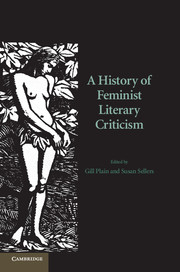Postscript: flaming feminism?
Published online by Cambridge University Press: 05 June 2012
Summary
The chapters contained in this volume ask us to consider decades of published scholarship that has analysed the inequities set in place by male monopolies over Western culture, excavated the diverse aesthetic achievements of literary women and linked gender biases to a host of racial, sexual, ethnic and national ideologies of subjugation. Given the weight and reach of this extensive enquiry, is it time to devise a new ceremony appropriate to the novel situation we find ourselves in? For surely an appreciation of women's centrality in literature and in critical responses to literature has gained ground among all but the most antediluvian or recondite of cultural historians. Taking a cue from Virginia Woolf's Three Guineas, finely elucidated in these pages by Jane Goldman, let us consider the ritual of destroying a phrase that just might have become obsolete, the words ‘feminist literary criticism’. Does the rubric have any meaning or future usefulness now that women writers participate so actively in the literary marketplace as well as the scholarly marketplace of ideas that we call the humanities? Since literary critics with every conceivable methodological approach and in every conceivable area of study employ gender as a category of analysis, should we type the phrase ‘feminist literary criticism’ in a large font, print it out, and then solemnly apply a match, while exulting at how quickly it burns?
- Type
- Chapter
- Information
- A History of Feminist Literary Criticism , pp. 336 - 341Publisher: Cambridge University PressPrint publication year: 2007



